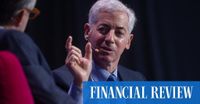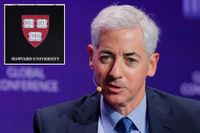In a striking critique of Harvard University, billionaire hedge fund manager Bill Ackman has called for a significant overhaul of the institution's leadership, particularly targeting Penny Pritzker, the chair of Harvard's governing board. Ackman, the founder of Pershing Square Capital Management, voiced his concerns during a panel at the Milken Institute Global Conference on May 6, 2025, just hours after the Trump administration announced a freeze on future federal grants to the university.
Ackman, who graduated from Harvard over three decades ago, expressed his discontent with how the university has handled its finances and its relationship with the government. "They have lost all future grants, their tax exemptions are at risk," he stated, labeling the situation as a result of “self-induced gross mismanagement.” His comments come in the wake of the Education Department's decision to freeze billions of dollars in future research grants until Harvard complies with certain demands from the Trump administration.
Harvard's response to this freeze has been one of defiance. The university claimed that the administration's letter imposes "unprecedented and improper control" over its operations and threatens to withhold funding for critical research. "The notion is the federal government money is only going to fund breakthrough research, that is just false," Ackman added, criticizing the university's investment policies and its management of its substantial $53 billion endowment, which he described as "poorly invested."
As tensions between the federal government and Harvard escalate, Ackman’s criticism has taken on a personal dimension. He has long been at odds with the university, particularly over its handling of antisemitism on campus. Last year, he made an unsuccessful attempt to get four candidates on the ballot for Harvard's governing board, reflecting his dissatisfaction with the current leadership.
Penny Pritzker, who has been at the helm of the Harvard Corporation since 2022, has faced scrutiny not only for financial decisions but also for the university's response to recent campus protests following the October 7, 2023, Hamas attack on Israel. These protests have raised significant concerns about antisemitism and have led to a review of Harvard's policies regarding such issues. Ackman stated, "It’s time for a change in leadership in the board at Harvard," emphasizing the need for new perspectives in the university's governance.
While Pritzker's tenure has been marked by challenges, she is no stranger to high-pressure environments. Having served as Barack Obama’s commerce secretary from 2013 to 2017, she has a long history of public service. However, her leadership at Harvard has drawn criticism, particularly regarding how the institution has navigated the complexities of academic freedom and federal funding.
In January 2024, Alan Garber took office as Harvard's president, describing the current climate as "an extraordinarily painful and disorienting time" for the university. Under his leadership, the administration has initiated disciplinary and academic policy changes in response to findings from task forces that spent 16 months investigating antisemitism and anti-Muslim bias on campus. Yet, Ackman believes these measures are insufficient and that the board's insularity is a significant problem.
Ackman’s comments come at a time when the relationship between Harvard and the Trump administration has become increasingly contentious. The administration's decision to freeze funding was accompanied by a letter detailing demands for changes in governance and the elimination of diversity initiatives in exchange for federal support. In response, Garber released a public statement asserting that Harvard would not relinquish its independence or constitutional rights.
This standoff has raised questions about the future of federal funding for Harvard, which has historically relied on such support for research and operational funding. The Trump administration's Joint Task Force to Combat Anti-Semitism has criticized Harvard's stance, emphasizing that the university's entitlement mentality is problematic.
As the conflict continues, Pritzker finds herself under intense scrutiny, not only from Ackman but from various stakeholders concerned about the university's direction. Despite the challenges, she has publicly defended Harvard's autonomy, arguing against increased federal oversight. "I think in general, across the country, people don’t want our federal government running our universities and our colleges," she remarked at the Semafor 2025 World Economy Summit.
Meanwhile, the Pritzker family has a long history of interactions with Trump, dating back to the 1970s when Penny's uncle, Jay Pritzker, entered into a contentious partnership with Trump over a hotel deal in New York. This history adds another layer of complexity to the current conflict, as Ackman’s criticisms echo longstanding tensions between the Pritzker family and the former president.
As the situation develops, all eyes are on Harvard and its leadership. The university's ability to navigate this crisis will likely have lasting implications for its funding, governance, and reputation. With Ackman’s calls for change resonating amidst the backdrop of a fierce legal battle with the federal government, the future of Harvard's leadership remains uncertain.
In an era where the lines between academia and politics are increasingly blurred, Ackman’s remarks serve as a reminder of the challenges facing elite institutions like Harvard. The coming months will be crucial as the university grapples with its identity, its mission, and the expectations of both its alumni and the broader public.



